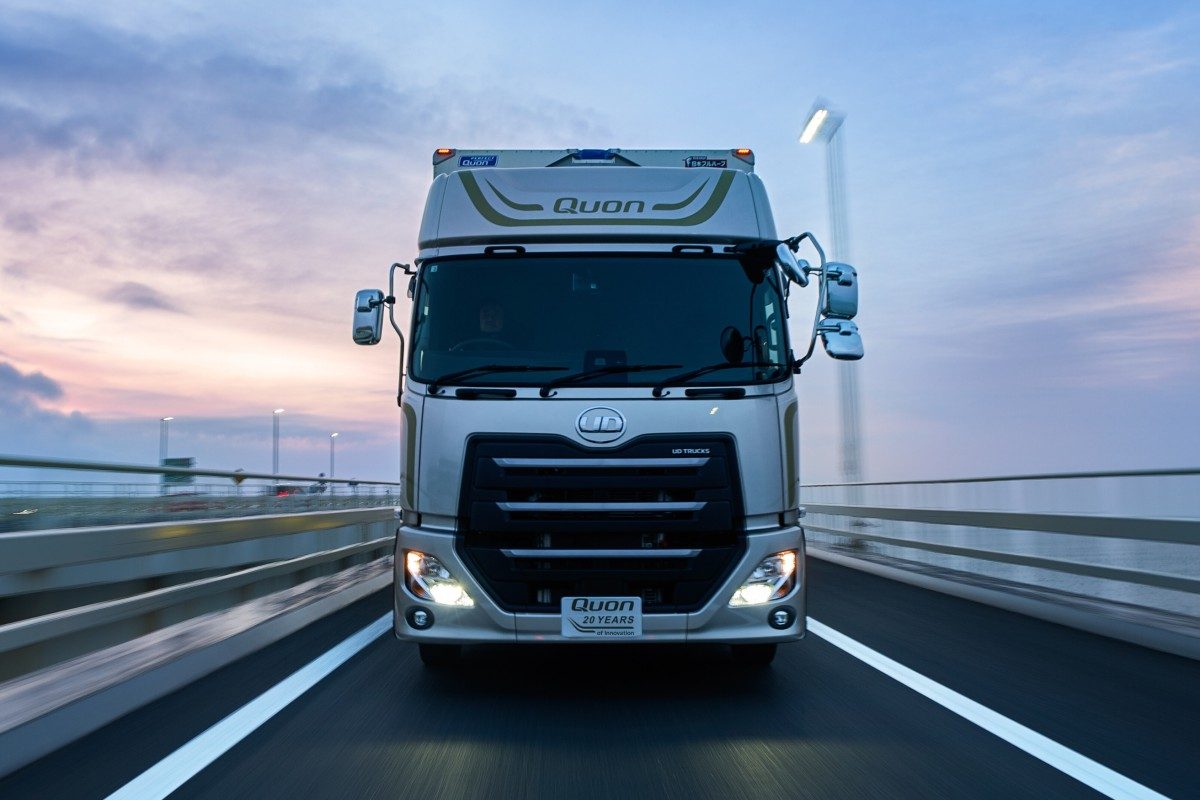The Sky’s The Limit
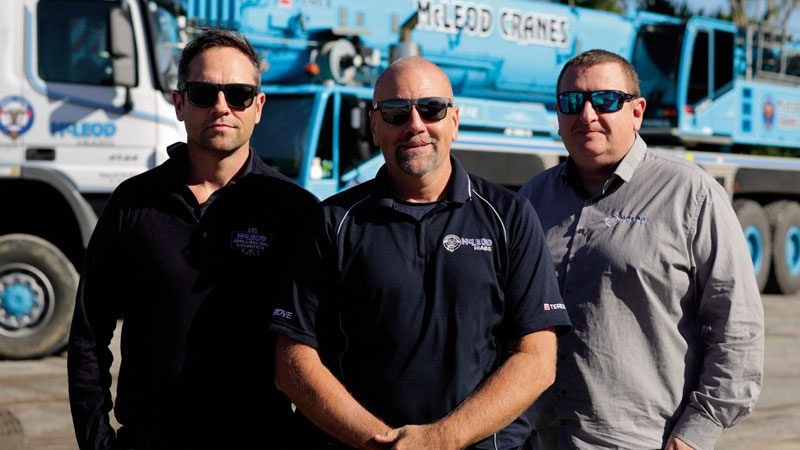
The turning point for the business post- GFC was responding to an RFP for crane work in the Taupo energy industry, where our bid was all about processes and systems that emphasised the welfare of our people in the workplace as well as productivity,” says McLeod director Phil Hutchinson. “They were the cornerstones of the business Scott and Peter wanted to build when they took the reins from their late father Curly, and they have an unwavering focus on that. Culture is everything.”
McCleod Cranes and Hiabs traces its roots back to 1996, when Ian ‘Curly’ McLeod and his boss Albert Smith shook hands and parted friends when they could see the crane business they directed diverging in two distinct directions; civil contract work and on-call customer work. Albert took the civil contract work – Smithbridge Ltd – and at 50 years old, Curly kicked off his Tauranga-based McLeod Cranes Ltd with an NK250v 25-tonner.
He and wife Anne had put everything on the line to start the business. Curly worked every hour God sent, and after working her day job at New Zealand Swimming, Anne would take care of the books.
Like so many small businesses, life tested their resolve early. On his first job with the Western Bay of Plenty District Council, a tomo opened up under one of the crane’s stabiliser legs. Luckily, the machine Curly and Anne mortgaged the house for miraculously lent against a building.
The NK250v was a machine that punched above its weight and that, combined with a relentless work ethic, saw expansion come quickly. In 1998 a 50-tonne machine was added, and the year after a 10-tonne machine, driven for eight months by Curly’s son Scott when Scott’s Navy years were up and before embarking on his OE.
“Cranes are not an easy business to be in,” says Scott. “Each one is like paying off a farm, and after 20 years paying it off, you have to buy the farm again! Oh, and you can’t tip a farm over or drop something off it!”
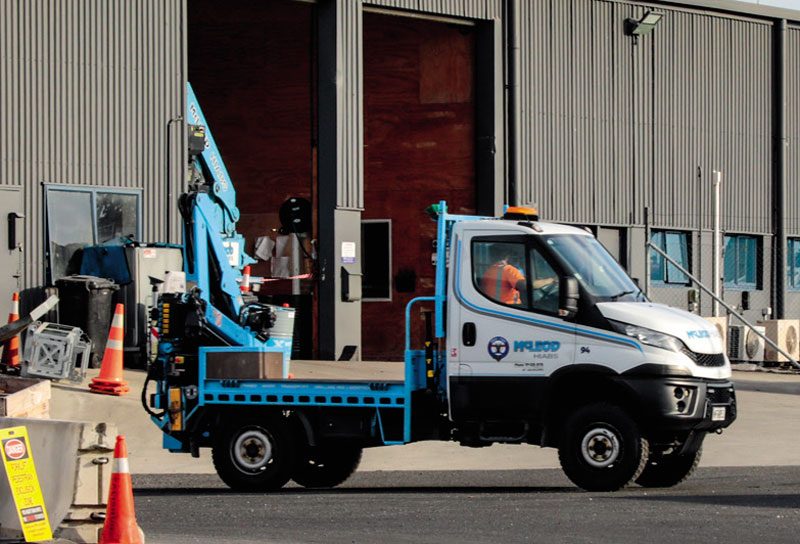
Curly worked tirelessly, building a sound customer base that included the likes of Port of Tauranga, a customer the company retains to this day. His reputation among the Bay of Plenty business community was that of a ‘good bastard’.
In 2006 Curly was diagnosed with cancer for the second time. Then, Scott was working as a computer programmer at the Tauranga City Council, and Peter was still overseas working in senior planning and lift roles on the Saipem 7000, a semi- submersible crane able to lift 14,000 tonne with a hook that weighs 200 tonnes. In other words, the cutting edge of global lifting.
Initially, the plan was for Scott to take a caretaker role until Curly was well,and Pete could get home. But, in 2007, Peter joined Scott in the family business they today run together.
“It wasn’t always easy, but a great experience I would not change at all,” says Scott.
Up until 2008, the business grew at about a crane a year, but 2008 is, of course, an ominous year in global economic history. Much to the disgruntlement of Curly, cranes had to be shed if the company was to survive.
“It was scary,” says Scott. “It was hard yakka and immensely stressful.” Scott and Peter’s cousin Lynda Hutchinson had taken over administration from Anne by this stage, and financial reporting had become a daily occurrence for her.
They may have shed cranes, but one thing Scott and Pete didn’t shed were the principles on which they wanted to build the next generation of McLeod Cranes, and that was about to pay off – big time.
Mix a Navy-trained electronics guy with mega- crane lift boss from the oil and gas world, and rest assured, you’ll create the ultimate process and compliance beast. From the get-go, the brothers vigorously pursued zero tolerance for shortcuts and she’ll-be-right. Health and safety, adherence to process, training, and impeccable record-keeping would be pillars on which the company would grow.
Saying it all is one thing, but their backgrounds meant they could deliver it in the real world. Their stoic belief in their company’s cultural pillars saw them prevail in the tender issued by MB Century in 2010 for crane support and drill-rig logistics in the Taupo geothermal fields. Suddenly, selling cranes returned to buying cranes as the sun once again came up in the Bay of Plenty. Pete upped sticks and moved his family to Taupo to oversee the work first-hand, establishing the Taupo depot also.
Cranes often need a battalion of support to carry all the bits and pieces they need to operate, things such as counter-weights and jibs. McLeod Cranes relied on third-party suppliers for this task but was realising that wasn’t working out. Its own support trucks would be better.
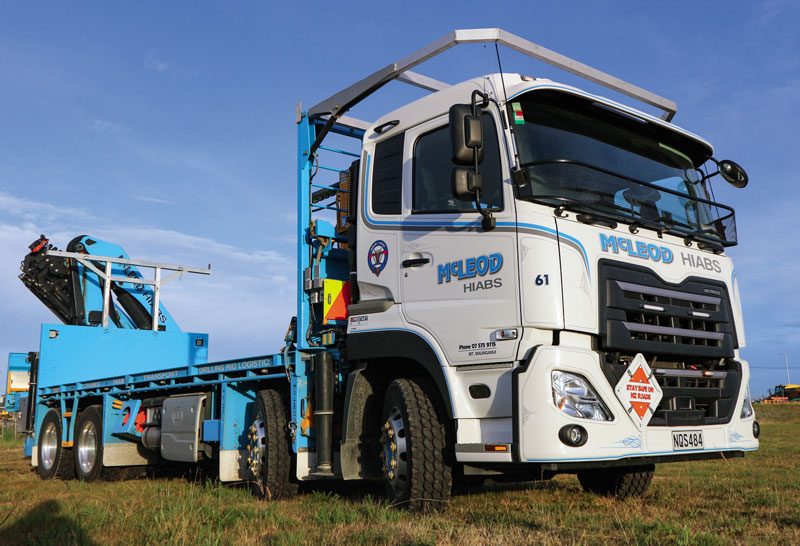
Sadly, Curly, had succumbed to cancer in 2012, aged 66. In cleaning up his papers and affairs, the family came across documents from Charles Brown, proprietor of Bay Hiab Transport, expressing an interest in Curly buying him out. The brothers decided to act, but truck-mounted cranes were a different world entirely from pure cranes. They not only needed transport know-how but someone they could trust to have full buy-in and deliver on the culture and values they based their business on. Who they needed was Lynda’s husband, cousin Phil, currently manager of TR Group’s Mt Maunganui branch, and an ex-Mainfreight operator and manager to boot.
“It was a tough decision. Man, it was tough,” recalls Phil. “TR Group is a wonderful company to work for. I loved the firm, the customers, everything. But Curly had been like a father to me, and Scott and Pete were reluctant to move on Bay Hiabs without transport knowledge.” Phil came on board as a shareholder and director in 2013 when McLeod’s bought the Bay Hiab business.
“There were 10 trucks of which eight were operating,” says Phil. “It was all paper- based despatch. There were no systems and quite a reluctance to work overtime or weekends. And the rates needed looking at. The learning curve for the crew was steep. But, today, two of the Bay Hiabs guys are still with us – Malcom Simpson and Joe Te Hani. Fantastic blokes.”
Initially, it was thought the Bay Hiab trucks would be occupied supporting the crane business, but to rehash an old chestnut, ‘lift it and they will be impressed’.
It didn’t take long for the newly minted McLeod Hiabs business to start winning work under its own steam, eventually growing at a quicker rate than the cranes, often needing two additions to the fleet per year. A whole new world had opened up.
Today the McLeod business has four divisions: Cranes, Hiab, Transport and ATF (Approved Transitional Facility). The latter business has evolved due to demand from the existing customer base. Scott is managing director, Pete is director assuming control of drill rig logistics, and Phil heads up the Hiab team.
“Outside of the project tendering processes we engage in, growth has come to us,” says Phil.
Scott, Pete, and Phil believe the growth in the company – to 155 staff with depots in Tauranga, Kawerau, Taupo, Hamilton, and Tokoroa – is testament to the fact that adherence to processes, systems, and compliance house the keys to staff capabilities, peace of mind, retention, respect, and ultimately the company’s success.
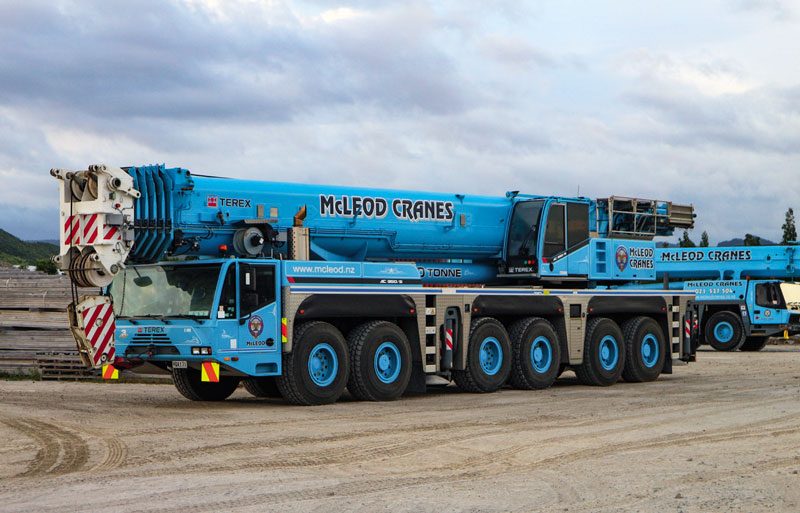
“Our approach has been key to us winning a number of blue-chip contracts of recent years, including distribution contracts at a leading building supply firm in the Waikato and contracts at Oji Fibre Solutions in Tokoroa.
“We place a huge emphasis on staff development and training, with three full-time trainers in the business and a fourth coming on board shortly. We’re also great believers in bringing new blood into the industry and run a number of cadets, all working their way through and sampling different divisions over a two-year period, ultimately choosing where they might like to go.
“The lack of cadet training in the wider transport industry is a huge problem, and one only the industry can solve. I’ve had operators come to me lamenting the lack of staff, yet there’s no willingness to take on the next young person. Getting the next generation involved and excited is vital.”
There’s a significant depot, workshop, and container- logistics-facility expansion underway at the company’s Truman Lane site at Mt Maunganui, which is already attracting interest from existing and prospective customers. And although growth is rapid, the adherence to detail, like everything being painted in fleet colours, remains. Even the new Ferrari reach stacker is going to be fleet colours. “They weren’t impressed we wanted it in company colours,” chuckles Phil.
It is a tragedy Curly missed the growth of the business to what we see today. The hours he devoted to the business’s formative years set the example in terms of work ethic and service to his sons, a couple of young bucks growing up in a crane wonderland. As polished as the McLeod operation is today, that legacy is one Scott, Pete, Phil, and the rest of the wider family and staff strive to hold true. After all, it’s encompassed in the catchphrase on every machine… ‘Good bastards’.
I’m sure when every crane points skyward, Curly’s looking down, duly proud of the Mount’s home-grown crane business today and what it is they stand for.





